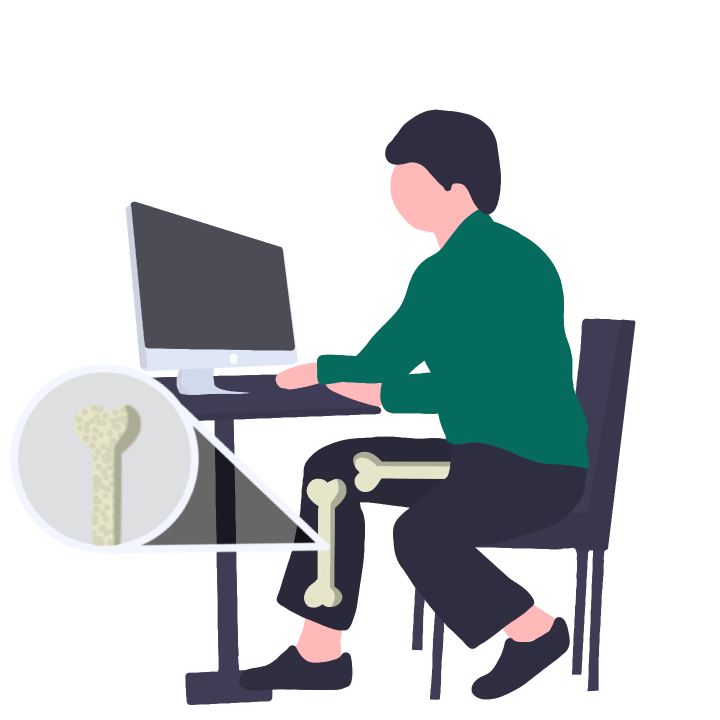What We Treat
Our Services
Thyroid
Disease We Treat Include
Hyperthyroidism (including Graves’ disease, Thyroiditis)
Hypothyroidism (including Hashimoto’s Thyroiditis)
Thyroid nodules, goiter
Thyroid cancer
Subacute Thyroiditis
Potential Management Strategies We Offer
-
Medical Management
-
Radioactive Iodine Treatment
-
Thyroid Biopsy
-
Surgical Referral
-
Your thyroid is a gland in your neck, located above the collarbone. It makes hormones that help regulate your metabolism and numerous other body functions.
Problems with your thyroid gland can cause unpleasant symptoms and lead to serious medical problems if left untreated. See the Capital Endocrine & Diabetes team at the first sign of a thyroid disorder.
-
You or a loved one may experience these or other thyroid disorders at some point in life:
Goiter: Enlarged thyroid gland
Hypothyroidism: Your body doesn’t produce enough thyroid hormone
Hyperthyroidism: Your body makes too much thyroid hormone
Thyroiditis: Thyroid gland swelling
Thyroid nodules: Thyroid gland lumps
Thyroid cancer: Cancer of the thyroid gland
See your endocrinologist for an evaluation at the first sign of a thyroid disorder to get treated and reduce your risk of complications.
-
Certain risk factors increase the chance you’ll develop a thyroid disorder. Examples include older age, being a woman, a family history of thyroid problems, or having an autoimmune disease.
Other risk factors include radiation treatment, past thyroid surgery, pregnancy, and thyroid-related medical treatments.
-
The symptoms you experience depend on the type of thyroid disorder you have. You might notice:
Fatigue
Sleeping problems
Feeling too hot or too cold
Constipation
Weight gain or weight loss
Dry skin
Hoarseness
Muscle weakness
Depression
Menstrual irregularities in women
Thinning hair
Impaired memory
Enlarged thyroid gland
To diagnose thyroid problems, your endocrinologist reviews your symptoms and past medical history. They evaluate your thyroid gland, have you undergo a blood test, and may complete a real-time ultrasound. They might recommend a thyroid nodule biopsy to make a final diagnosis.
-
Your treatment for a thyroid disorder depends on the type and severity of your condition. Your specialist may recommend lifestyle changes, such as weight loss or dietary changes. They might suggest you take thyroid medicines, undergo radioiodine treatment, or undergo thyroid surgery.
Your endocrinologist personalizes each treatment to give you the best outcome.
Don’t live with symptoms associated with a thyroid disorder when simple treatments are at hand at Capital Endocrine & Diabetes. Schedule an appointment by phone today.
Diabetes
Disease We Treat Include
Type 2 Diabetes
Type 1 Diabetes
Secondary Diabetes
Gestational Diabetes
Potential Management Strategies We Offer
-
Oral Medication
-
Injectables Including Insulin
-
Continuous Glucose Monitoring
-
Insulin Pump Management
-
Diabetes is a group of conditions where you make too little insulin hormone or don't use it efficiently. That ultimately means that you can't regulate blood sugar levels, which can ultimately lead to a number of different health issues, including vision loss, heart disease, nerve damage, and vascular damage.
-
The types of diabetes include:
Type 1 diabetes
Type 1 diabetes is a condition in which your immune system attacks your pancreas and prevents it from making insulin. This form of diabetes isn't preventable.
Type 2 diabetes
About 95% of people with diabetes have Type 2 diabetes, which occurs when you make insulin but don't use it well. Type 2 diabetes is preventable. If you have prediabetes — elevated blood sugar levels that aren't high enough to be Type 2 diabetes — you can take steps like losing weight and eating healthy to prevent it.
Gestational diabetes
Gestational diabetes occurs only during pregnancy. It affects women who've never had diabetes before. Gestational diabetes almost always goes away after birth. But, your chances of developing Type 2 diabetes later increase if you have gestational diabetes and your baby shares those risks.
Secondary diabetes
Secondary diabetes occurs when another disease or condition causes diabetes. Endocrine disorders, such as adrenal disorders and pituitary disorders, are a common cause of secondary diabetes.
At Capital Endocrine & Diabetes, the team treats all types of diabetes.
-
Capital Endocrine & Diabetes tailors diabetes care for you. The team schedules plenty of time for each patient, and they explain all your treatment options in detail. Usually, diabetes treatment involves:
Lifestyle changes
Lifestyle changes like weight loss, improved nutrition, and exercise can all help with blood sugar management. The team supports you with Ideal Protein (a medical ketogenic weight loss protocol), as well as one-on-one nutrition counseling and other lifestyle guidance.
Monitoring blood sugar
A continuous glucose monitor tracks your blood sugar throughout the day and night. An implanted tiny sensor relays this info to you on a monitor or even your smartphone, alerting you when your blood sugar is too high. Continuous glucose monitors may be part of an insulin pump or a separate device.
A continuous glucose monitor doesn’t eliminate the need for finger pricks, but it can greatly reduce them. Some people may opt for strictly finger pricks instead.
Medication
Diabetes medication may include oral medications, injected insulin, or insulin pumps that automatically deliver insulin to your bloodstream.
The team also offers group diabetes education classes to help you understand and manage your disease in the best possible way.
The Capital Endocrine & Diabetes team is here to support you with the most customized diabetes treatment plans. Call the office today to book an appointment.
Endocrine Disorders
Disease We Treat Include
Pituitary tumors (including acromegaly, prolactinoma)
Adrenal disorders (including Addison’s disease, adrenal nodules, pheo)
Polycystic ovarian syndrome (PCOS)
Male testosterone deficiency (hypogonadism)
Hypocalcemia
Hypercalcemia
Hypoparathyroidism
Hyperparathyroidism
Potential Management Strategies We Offer
-
Medication
-
Hormone Replacements
-
Radiation Treatment
-
Surgical Referral
-
PCOS is a type of hormone disorder in which your ovaries and adrenal glands make excessive androgens (male hormones). That causes a variety of health problems, including infertility. PCOS frequently occurs alongside diabetes.
-
PCOS causes symptoms such as:
Infertility - inability to conceive a baby
Irregular periods, especially sporadic periods
Weight struggles - extra weight, difficulty losing weight
Chronic fatigue
Hirsutism - heavy hair growth on the chest, face, abdomen, and thighs
Severe acne post-adolescence
Acanthosis nigricans - thick, dark, and velvet-like patches of skin
Depending on the underlying factors involved, you may also experience other symptoms.
PCOS symptoms frequently mimic those of endocrine disorders, especially adrenal disorders like Cushing’s syndrome and congenital adrenal hyperplasia.
-
Capital Endocrine & Diabetes offers symptom management and helps you to prevent further health problems.
Depending on your particular issues, you may need help with medical weight loss, hormone treatments, diabetes-specific treatments like an insulin pump, and healthy lifestyle changes. If you're struggling with infertility, the team may refer you to a specialist.
If you have symptoms like weight gain, missed periods, or infertility, it could be PCOS. Call Capital Endocrine & Diabetes.
-
The pituitary gland is a part of your endocrine system. The pea-sized organ, located at the bottom of your brain, is often called the master gland because it creates some vital hormones while also controlling other glands, including your thyroid and adrenal glands.
Your pituitary gland plays a role in stimulating growth, managing stress, regulating metabolism, sex hormone production in men, ovulation in women, and many other things.
Because the multitasking pituitary gland serves so many functions, pituitary gland disorders can cause some very serious health problems.
-
Pituitary disorders happen when your pituitary gland produces either excessive or inadequate amounts of a hormone, including adrenocorticotropic, follicle-stimulating hormone, luteinizing, growth hormone, prolactin, thyroid-stimulating, oxytocin, or antidiuretic hormone.
Most pituitary disorders occur when you develop a noncancerous tumor on the gland. The two main types of tumors are secretory tumors, which impact hormone creation, or non-secretory tumors, which don't cause hormone problems but do cause issues like headaches or vision loss. Cancerous tumors of the pituitary gland are very rare.
Some of the main pituitary disorders include:
Acromegaly - excess growth hormone
Prolactinoma - excess prolactin
Cushing's syndrome - excess cortisol
Growth hormone deficiency - inadequate growth hormone
Diabetes insipidus - too little antidiuretic hormone
Hypogonadism - testosterone deficiency
Lymphocytic hypophysitis - pituitary gland inflammation
Craniopharyngioma - a tumor that pressures the hypothalamus
This is just a short list of the different pituitary disorders. The group of disorders can affect the body in many different ways because they can affect so many hormones.
-
The Capital Endocrine & Diabetes team may prescribe hormone therapy, medication to block hormone overproduction, radiation therapy, or surgical referral to remove the tumor.
Pituitary disorder treatment can restore your quality of life, so don't delay it. Call the Capital Endocrine & Diabetes office to book an appointment.
-
Adrenal disorders are problems within your adrenal glands. Your two adrenal glands produce the hormones that control many aspects of your bodily function, including your stress response, metabolism, and fluid balance.
When there’s a problem within one or both adrenal glands, you may develop disruptive or dangerous symptoms.
-
Capital Endocrine & Diabetes offers customized adrenal disorder treatment, so your solution may involve one or more strategies. Options include medication, hormone replacement therapy, radiation treatment, and surgical referral for cases that don’t respond to nonoperative care.
Book your appointment by calling Capital Endocrine & Diabetes or scheduling online.
Metabolic Bone Disorders
Disease We Treat Include
Osteoporosis and Osteopenia
Vitamin D deficiency
Osteomalacia
Potential Management Strategies We Offer
-
Oral Medications
-
Injectables
-
Osteoporosis is a condition in which your bones develop large holes, making them very porous and vulnerable to fracture. As endocrinology specialists, the Capital Endocrine & Diabetes team specializes in treating both osteoporosis and the disorders that can contribute to it.
The specialists also treat other bone conditions, including osteopenia — bone weakening that happens before osteoporosis — and osteomalacia — bone softening, typically related to vitamin D deficiency.
-
Osteoporosis has well-known risk factors, including:
Sex - women are four times more likely than men to have osteoporosis after age 50
Family history of osteoporosis
Poor nutrition
Calcium deficiency
Vitamin D deficiency
Early menopause
Being underweight
Small body frame
History of cigarette smoking
Long-term use of corticosteroids, blood thinners, or anti-seizure drugs
Lack of exercise
Hormone imbalance
Adrenal disorders
Thyroid disorders
Pituitary disorders
Malabsorption disorders like celiac disease
Rheumatoid arthritis
Chronic hepatitis C
These are just some of the risk factors for osteoporosis, so it's important to pay attention to any changes in your health and seek care promptly, especially as you age.
-
Because osteoporosis is generally a painless condition, many people don't know that they have it until they break a bone.
The most effective way to diagnose osteoporosis is a bone density test. A dual-energy X-ray absorptiometry (DXA) scan checks the bone density in two important areas: your hip and spine.
The team at Capital Endocrine & Diabetes may recommend this scan if you break a bone and have any risk factors for osteoporosis. Or, you may need a DXA scan if you start losing height or have other suspicious symptoms that could indicate osteoporosis.
Even people with no risk factors for osteoporosis need a bone density scan; age 65 for women and 70 for men.
-
Osteoporosis is treatable, but earlier treatment provides the best results. The team at Capital Endocrine & Diabetes can help you with lifestyle changes like weight loss, nutritional support, and supplements. They can also prescribe oral or injectable medication to prevent bone loss and help you rebuild lost bone.
You may need to make some medication changes to minimize your risk of osteoporotic fractures as well.
If you need osteoporosis testing or treatment, call Capital Endocrine & Diabetes or book an appointment online today.
Obesity and Weight Disorders
Disease We Treat Include
Hypothyroidism
Cushing’s Syndrome
Polycystic Ovary Syndrome
Other Related Disorders
Potential Management Strategies We Offer
-
Nutrition Guidance
-
FDA-approved Weight Loss Medication
-
Endocrine disorders, including pituitary disorders, adrenal disorders, diabetes, polycystic ovary syndrome (PCOS), and thyroid disorders, can make it easy to gain weight and very hard to lose it. It may feel like you can’t lose weight, no matter what you do.
Disorders of the endocrine system affect your hormones. Hormone changes that slow your body's energy use (metabolism) often cause weight loss difficulties, just as hormone changes that speed up metabolism can cause rapid weight loss.
Slowed metabolism is quite common with endocrine disorders, including hypothyroidism (underactive thyroid), Cushing's syndrome, and PCOS.
-
If you’re having difficulty losing weight, or if you’re gaining weight despite eating sensibly, it’s time to try a new approach with medical weight loss at Capital Endocrine & Diabetes.
The team of endocrine disorder specialists can expertly manage your underlying conditions and help you lose extra weight safely using proven methods.
-
Capital Endocrine & Diabetes customizes your medical weight loss plan based upon your health problems and needs. Most patients achieve significant weight loss with a combination of weight loss medication.
-
Capital Endocrine & Diabetes offers a variety of FDA-approved weight loss medications that suppress your appetite, reduce fat absorption, or work in other ways to help you succeed.
Another big part of your weight loss program involves correcting underlying issues. For example, you may need hormone treatment, an insulin pump, injected medications, radiation therapy, or surgical referral to adequately manage your endocrine problem and position yourself for lasting weight loss success.
If you’re ready to reset your metabolism and start losing weight while managing your endocrine disorder with peak effectiveness, call Capital Endocrine & Diabetes.





















